After his installation as shepherd of the Archdiocese of Philadelphia’s almost 1.5 million Catholics a year ago, Archbishop Charles J. Chaput immediately began to put out fires of the crises he’d inherited.
Many of them where unprecedented in the more than 200-year history of the archdiocese: a severely contracting Catholic school system, deteriorating Church finances, parishes under threat of closure or consolidation. Add to that the ongoing fallout of the priest sexual abuse scandal that saw priests on trial in criminal court, priests whose ministerial status remained in limbo and priests who were overstretched and just plain demoralized.
“I’d like to set fires rather than put them out,” said the archbishop, who sat for an interview with CatholicPhilly.com days before his Sept. 8 one-year anniversary as head of the Archdiocese. “The Lord has given me a lot of fires to put out, where my preference is to light fires.
[hotblock]
“But I think things are getting better. The second year will be more a matter of lighting fires. The most important one is the new evangelization: The fire of living the Gospel and religious commitment and religious identity.”
Archbishop Chaput spoke at length about his concerns and struggles, plus signs of hope he sees for the Archdiocese.
“There’s always hope because of the resurrection of Jesus Christ,” he said. “In most of our parishes there’s ordinary parish life going on, and that’s very hopeful. The majority of our people, who are going to church at least, haven’t let the problems we have undermine their faith or their charity, so I am deeply grateful for that. To see the operation of grace of the Holy Spirit in our parishes is a sign of hope. It’s the most important sign of hope for the Church.”
While he didn’t arrive in Philadelphia with a to-do list, he could not have imagined the number and severity of issues he’d have to address. He admitted earlier this year that one of them, the strong emotions expressed over the recommendations to close or consolidate dozens of Catholic schools, surprised him.
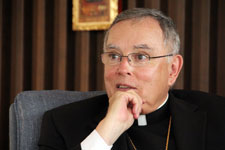
"The Lord has given me a lot of fires to put out, where my preference is to light fires," said Archbishop Charles Chaput. "The most important one is the new evangelization: The fire of living the Gospel and religious commitment and religious identity."
Any one of the items on a checklist of challenges in the past year might be enough to overwhelm an organization. Seen together, the accomplishments are staggering:
*Acceptance of the Blue Ribbon Commission on Catholic Education’s original recommendations to consolidate scores of Catholic parochial schools and close four high schools. Subsequently, the Archbishop opened an appeals process that resulted in a revised mix of mergers or closures, and through the Faith in the Future Foundation, he announced all the high schools would remain open for this academic year.
*Rallying local Catholics to advocate for the successful passage of expanded school choice in Pennsylvania. The new measure, which increases use of state tax credits to fund tuition for more students, is seen as vital to stabilizing Catholic school enrollment now and raising it in the future.
*Turning over operational responsibility for the Archdiocese’s 17 Catholic high schools to the Faith in the Future Foundation, an unprecedented initiative.
*Final decisions on the ministerial status of priests caught up in the vortex of Church actions following the 2011 report of a second Philadelphia grand jury investigating the clergy sexual abuse scandal. Even as the criminal trial of priests accused of misconduct in the scandal unfolded, Archbishop Chaput announced on two occasions the findings of investigators into more than a dozen priests. Some were cleared for a return to priestly ministry, others were not, while still more remain uncertain of their return to ministry pending further investigation.
*Closure or consolidation of 12 parishes after review and consultation in the parishes and their deans.
*Naming of deans and deaneries to better organize parish life, reorganization or closure of offices in the central administration of the Archdiocese and consequently, layoffs of almost four dozen employees.
*Publication of an archdiocesan statement of finances in details that had never been previously released.
*Folding of The Catholic Standard and Times newspaper and Phaith magazine.
Some big problems remain to be tackled, however, including a bedrock issue for the Catholic Church here and beyond: only about 20 percent of registered Catholics in the Archdiocese attend Mass regularly in their parishes.
For this reason, a high priority for the Archbishop is spiritual renewal through the new evangelization in the Catholic Church and its application in the Archdiocese, which he has called “mission territory.”
“Pope John Paul II had been telling the western world for a long time that we’re in mission territory. When I say we’re in mission territory I’m not referring just to the Archdiocese of Philadelphia but to the Church in the United States and the Church in the western world. We are candidates for the new evangelization because we need to be re-evangelized.”
There are things Catholics can do to participate in this work, but their first task is to look within themselves, Archbishop Chaput suggested.
“The hardest people to convert are those who think they’ve already been converted,” he said. “The hardest people to preach the Gospel to are those who think they already know it; people who identify themselves as Catholics when they really don’t know what that means except that it’s part of their family tradition. Those are all examples of candidates for the new evangelization.
People must ask themselves, “Am I a candidate for the new evangelization?,” the archbishop said, adding that everyone is. That leads to deepening one’s faith and, returning to a theme, becoming “on fire with the Gospel and the love of Jesus Christ.”
“That means you want to bring others to Him and you participate in active programs of re-evangelizing yourself but also the re-evangelization of the culture, the people around you. It means involvement, that you’re aware of your personal needs and the needs of the Church. There’s plenty of work to do in the new evangelization.”
In this day and age that work falls mostly to lay Catholics, who the archbishop called “the primary agents of evangelization.”
“In the past,” he said, “we’ve depended on the clergy (and religious) to do that, and now there aren’t as many clergy and religious. But the reason for lay involvement in evangelization is not because we don’t have enough priests and sisters, it’s because it’s their job by baptism anyway. And if we had lots and lots of priests and sisters we’d still want the laity to do it because it’s the nature of their vocation in the Church.”
Lay Catholics have to be invited into participation in the new evangelization and equipped by the Church with educational programs “so they feel confident about the Gospel,” the Archbishop said. “Confidence will lead to activity that is evangelical. Invite them, educate them and let the Holy Spirit let them loose on the world.”
Archbishop Chaput still grapples constantly with perhaps the most serious ongoing problem, Church finances.
Assessments, or payments, from financially struggling parishes to the Archdiocese declined while soaring legal costs and ongoing traditional expenses further strained archdiocesan coffers. Even after administrative reorganization and employee layoffs, the archdiocese is still facing up to a $6 million deficit in the current fiscal year.
“One of the things people need to understand is that when I arrived in the Archdiocese we had nearly run out of money,” Archbishop Chaput said. “So the decisions I’ve had to make (such as) to cut back on employment, it’s not been something I previously chose to do. But we just don’t have any money so I’ve been forced to make decisions and make some unfortunate ones.”
The situation has degraded so badly that by this point, the Archdiocese is attempting to sell property simply to generate cash to meet obligations. Properties up for sale include a vacation home for retired priests in Ventnor, N.J., an office building and parking lot adjacent to the Archdiocesan Pastoral Center in Center City, Philadelphia; and the archbishop’s residence, a mansion that has traditionally been the home of Philadelphia’s archbishops.
“I’m selling (that) house actually to get us through the winter because we are in a position where the cash flow issue is huge for us, every month,” Archbishop Chaput said. “Each month is a struggle and we’re anticipating a $5-6 million deficit for this current fiscal year. That means (money) going out that we aren’t bringing in. And when you don’t have anything (coming) in, you have to sell assets to bring in cash. So I need to sell properties just to pay bills.”
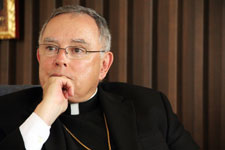
“It’s always said that the Church is a big business, because there are so many of us and we have so many institutions. But it’s a family-owned business. It’s much harder to downsize your family than it is to downsize your business. When we downsize ministries of our Church we’re downsizing our family as well as our Church.”
There may be more reductions in archdiocesan ministries to come, but that remains to be seen.
“It all depends on the cash-flow situation,” he said. “You don’t want to cut things that are at the heart of the ministry of the Church. We’ve done that already. We’ve cut our youth ministry program in a very serious way; we’ve cut the newspaper, the magazine. So I hope we won’t have to cut more but I just don’t know.
“But I am not afraid. Because if we don’t have money, then I have to deal with that reality, the reality that God gives us.”
In dealing with the Archdiocese’s precarious financial condition, the Archbishop likened the challenges to those a family might face.
“It is a family,” he said. “It’s always said that the Church is a big business, because there are so many of us and we have so many institutions. But it’s a family-owned business. It’s much harder to downsize your family than it is to downsize your business. When we downsize ministries of our Church we’re downsizing our family as well as our Church.”
Going forward, the Archbishop pointed to the need to “recommit ourselves to the traditional ministries of the Archdiocese of Philadelphia too, (especially) schools.”
He called Catholic schools “important communities of evangelization and formation … of minds and hearts.”
But schools should produce young people who graduate with a sense of Christian mission, and who are not only well prepared academically but “they know they are equipped for something and they’re going to embrace it.”
He offered a word of caution and a challenge to everyone working in Catholic education: “The danger of course is that people identify being Catholic with going to a Catholic school without actually maybe even believing what the school teaches,” he said. “That’s unfortunate because they can come out thinking they’re Catholic and they have nothing else to learn, when maybe they haven’t learned anything at all about the Church.”
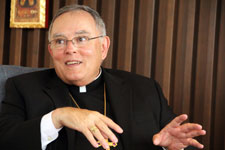
“Please know that I love you as my family in faith, and pray for you daily and thank God for you. I ask you to remember me in your prayers as well, because I need them. May God bless you and all those you love. And may God guide the Church with His wisdom, mercy and justice in the year ahead.”
Yet Archbishop Chaput remains hopeful as he looks forward to succeeding years in the Archdiocese.
He noted a hopeful sign in the success of this year’s Catholic Charities Appeal, which at nearly $8 million raised to date is above levels of recent years. He also mentioned that St. Charles Borromeo Seminary last month welcomed 11 new seminarians for Philadelphia, who now comprise the contingent of 51 studying for the Archdiocese.
In his first year the Archbishop took an uncommon initiative to personally interview young men interested in discerning a call to priesthood by meeting with them before they even made application to the seminary.
The purpose, he said, is “to encourage those who are hesitant but also to evaluate them. I have to make a decision of them eight or nine years down the road so it’s good to begin to know that early on.”
At the one-year mark of his administration, Archbishop Chaput wrote a letter to priests of the Archdiocese Aug. 31 in which he expressed support and prayers for them. He said he hoped to spend more time in parishes with the priests and people.
Days later he wrote a letter to all the faithful of the Archdiocese, to be reprinted in church bulletins this weekend.
Again he mentioned spiritual renewal, which in the future will require “deep changes” in how Catholics think and behave, and in the structures and organization of the Archdiocese.
“We can no longer allow ourselves the complacency of the past,” he wrote. No longer must the work of the Church be done “the way things have always been done,” but rather by reflecting today’s realities “if we have any hope of preaching Jesus Christ to the world around us. This is the only reason the Church exists.”
He also stressed that Catholics “need to speak the truth to each other with charity and respect – but also candidly and without fear.”
He closed the letter with tender words of support.
“Please know that I love you as my family in faith, and pray for you daily and thank God for you. I ask you to remember me in your prayers as well, because I need them. May God bless you and all those you love. And may God guide the Church with His wisdom, mercy and justice in the year ahead.”
PREVIOUS: Innovative Catholic high school opens in Philadelphia
NEXT: Former school superintendent receives top papal honor



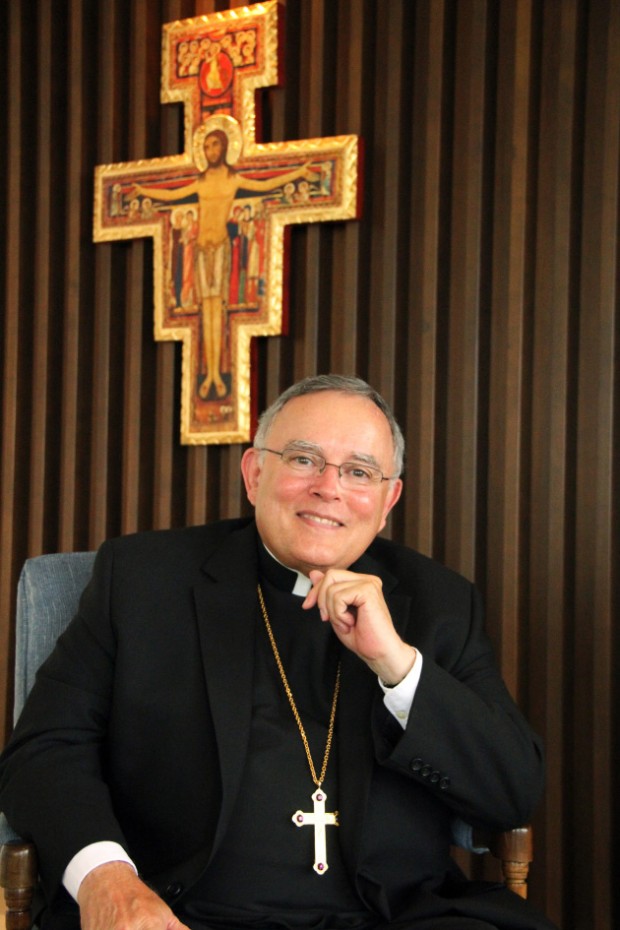
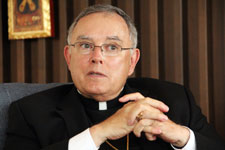
AMEN! Jacobum. Thank you for defending the Truth with such wisdom and clarity.
I have come to bring fire to the earth, and how I wish it were blazing already! (Luke 12:49)
Happy to see your pastor on the path less taken.
I think a problem with the Catholic Church in America, more so in the laity, is that they look for outward inspiration rather than the inward kind. Why then do we refer to certain factions as “the right” or “the left”, or why must we throw more than due regard to the observations of the Church from outwards? (Just using the examples, not calling the commentator out.)
If it is obvious that we learn by example (inspiration; where I’m from, we say “monkey see, monkey do”), then we must pay extra attention to the reminder from our Lord that we are in the world, not of the world, so as to avoid assimilating ourselves to secular cultures, to the detriment of the Church.
It is true that people who leave the Church do not understand her, and that people who are (especially actively) dismayed with the Church should, instead of join the ignorant on their way out, convert that energy into fuel that is usable in promoting right things.
These are points that authentic faithful should raise in dialogue with others and bear in mind as well, because the Church is a divine creation of human composition, and besides the fact that we all face the effects of sin, Jesus did choose Judas (in that he reminds us of this fact and/or that there are some factions in the Church that go a little too far).
So let us, according to what God wants, and just like Archbishop Chaput, take our inspiration, our influence, from within the Church. As a friend of mine once put it, one does not go to a drunk to learn how to be sober. Let us love our Church.
I have no doubt that American Catholics have that love, but as challenging as it is for you, it is the same for me and for the (concerned) faithful all over the world. We can take the approach of the gardener who talks and sings to the flowers and plants while tending. Our words must be consistent with our actions; this is the lesson of the sacraments, of the Word of God…
See that everything is intertwined, and one would think that, as in most cases, such an abundance of things would allow the message to be carefully and clearly selected. It is a matter in all times to take the complexity of this abundance and convert it all to something of simplicity, not wasting as in the secular world.
Anyway, I have written enough. God bless the RC Church of Philadelphia!
Johan, Metropolitan Archdiocese of Port of Spain, Trinidad and Tobago, the Caribbean
Mr Kennedy: How’s that open arm approach worked out for the Episcopal/Anglican Church over the last 10 years? It’s been a disaster by any measure.
If you mean by the code words “open arms”:
(1) full acceptance and tolerance of practicing homosexuals with full access to all of the sacraments including the Eucharist…Well it’s not going to happen…because it can’t happen…because “homosexual acts” are grave sins and intrinsic evils according to Church teaching & doctrine.
(2) It’s right up there with contraception and abortion. If you disagree then don’t blame the Church. Blame the founder of the Church…He lived, died and rose from the dead 2000 years ago. His name was Jesus Christ, the Son of God. Don’t think one could take it to a higher court than God.
(3) As to those who have homosexual tendencies, they are sons and daughters of God just like everyone. Therefore the Church always has and always will accept them….just not their sin. This is no different than anyone else. It is and will remain so regardless of the shouting, militancy, and phony studies trying to prove homosexuality is an inherent uncontrolled involuntary condition…such as one’s skin color. There is No credible scientific or moral evidence to support this despite what some dissident nuns or priests might imply.
(4) As to the clergy and people leaving? Anyone who leaves the Church really does not understand their Catholic Faith. Period! Christ founded one Church…The Catholic Church. No question that the last 50 years have been an absolute mess in the Church and Western Society at large. But that’s the fault of the messengers (clergy & laity alike)…not THE MESSAGE.
(5) Life can be hard. Sin makes it worse. Can’t overcome sin on our own. Need grace to do it. Church, through the Sacraments provides the grace to do so. It’s a real personal choice. The sacraments are valid even when administered by fallen priests. To leave the Church and the Eucharist is spiritual suicide. For What? So you can continue with a sinful lifestyle that is excused and still claim to be “saved”
(6) Although Christ told Peter the Gates of Hell would not prevail against the Church, He did say how small the Church might become. The one thing that will never change is Truth. To quote St Thomas Aquinas..”Truth Himself Speaks Truly or There is nothing True” Christ’s Church is Truth. Learn it, embrace it and live it. We are all called to do so. When we begin to do so sincerely, the Lord will provide the rest and this culture of death will begin to heal. It will not do so before then and you see people begin to admonish the sinner rather than justify the sin.
The happy, clappy, politically correct, self indulgent life style might feel good. But feelings are fleeting. Unchecked they hollow out the soul and justify bad behavior. It can lead to well meaning adults suggesting that the Church accept & tolerate sin in direct contradiction to TRUTH.
One only has to look at the current condition of the Church to see how that has worked out. In a word? Terrible!
The cuts to the Hispanic apostolate are particularly worrisome. Well-established ministries by women’s religious orders in suburban areas and neighborhoods in the city that have seen great expansion thanks to the Latino community have been abandoned to the few dedicated (but seriously overtasked) priests who can speak Spanish, and — sadly enough — to those other priests who have no interest in ministering to Latinos and who can’t or don’t want to offer the sacraments in Spanish. The young seminarians who can speak Spanish are, inconceivably, being assigned to parishes with no Latino Catholic community. Between that and the closure of a number of churches that had established Latino congregations at Spanish Masses, the Church of Philadelphia is increasingly perceived by Latino Catholics themselves as less and less interested in ministering to our humble, hard-working, family-centered and devoted communities. It seems an incredibly shortsighted strategy on the Archdiocese’s part — financially and spiritually — and I’m saddened each time I hear of another instance of it.
The Socialologist in me says that we in the Church are at cross purposes. The Bishops are focused on a false reality where they are perfect and that we can return to a world in which all Catholics obeyed the Bishops and Mass attendance was around 100%. Lay Catholics realize that the world has changed and the Church is now totally out of step with reality.
I am troubled with the low Mass attendance among Catholics. Even if we assume that all Catholics who attend Mass on Sundays are right wing Catholics, that means that only 20% of Catholics are willing to obey the Bishops and engage in the false reality that everything is OK. That would imply that 80% of Catholics are left wingers who will not obey the Bishops and either do not believe in God or are attending a different Church.
It seems that the right wingers have rose colored glasses on and do not see reality for what it is while the left wingers have simply given up. In my view, the only answer is to focus on what Pope John XXIII wanted to do and open the windows of the Church open to the reality of change. I think the right wing Bishops cannot return the Church to health by dragging it back to the 1400’s.
It would be nice if “reflecting today’s realities” included fully opening the arms of the church to our gay and lesbian family members. As Bishop Eugene Robinson pointed out – you cannot evangelize young people by telling them them that the people they love are 2nd class citizens in the Church. This does not align with their understanding of the love of God, and so they seek community elsewhere, whether it is ecclesial or in a group of friends at Sunday morning brunch.
The other reality is that an aging clergy cannot meet the pastoral demands they face, especially being able to provide some kind of personal contact with people. Look to the number of Hispanics joining small, evangelical churches – leaving the anonymity of larger Catholic parishes.
“Folding of The Catholic Standard and Times newspaper and Phaith magazine.”
I don’t think this should have been included in the list of accomplishments.
Everything is available on the Internet — papers are far to costly…..